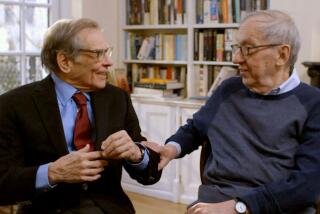Paperback Writers: James Boswell’s ‘London Journal 1762-1763’; Michael J. Arlen’s ‘Exiles’ [Updated]
The handwritten pages of James Boswell’s “ London Journal 1762-1763” languished forgotten in a trunk in Scotland before being brought to light in the middle of the last century and issued under the auspices of Yale University. This event, together with publication of successive hordes of newly discovered Boswell material, at last separated him from Dr. Samuel Johnson, in whose large and overbearing shadow he had lingered after writing his biography, and established him as a personality in his own right. The “London Journal,” now available in an unexpurgated new edition (Penguin Classics: $17 paper) is vivid, intimate, compelling and seemingly off-the-cuff, yet carefully wrought.
Its subjects of sex, depression, ambition, booze, family, the pain and pleasure of self-examination and self-realization now form the staples of confessional literature. They concern a contemporary writer like Mary Karr, and they concerned Boswell too, although Boswell is far more vain: “Proud of my godlike vigour I soon resumed the noble game,” he records on Jan. 12, 1763. “Five times was I fairly lost in supreme rapture. Louisa was madly fond of me; she declared I was a Prodigy, & asked me if this was not extraordinary for human nature.”
Boswell, then age 23, had been wooing Louisa, an actress, almost since his arrival in London from Edinburgh the previous November. On the morning subsequent to conquest he patrols up and down Fleet Street, puffed-up with absurd male pride, but still, as always, the thrifty Scot: “I really conducted this Affair with a manliness and Prudence that pleased me very much. The whole Expence was just 18 shillings.” He drinks tea with Louisa, studies French with her and enjoys further sexual pleasures. Within a week, however, Boswell finds himself wailing: “Am I then taken in? Am I who have had safe & elegant intrigues with fine women, become the dupe of a Strumpet? Am I now to be laid up for many weeks to suffer extreme pain & dull confinement, and to be debarred all the comforts and pleasures of life?” Louisa, it transpires, has given him the clap, and Boswell sinks into gloom.
The whole Louisa episode comes at a time when much besides was happening in Boswell’s busy London schedule. The events just seem to spring up, and yet the underlying narrative is cunningly laid-in, almost like a screenplay, with beats leading to climax and then comedic comeuppance. Boswell, in other words, knew what he was about, and in the “London Journal,” he taught himself to be a writer. Hence the appeal of this book to anybody who aspires to earn a living through words. “Style is to sentiment what dress is to the person,” he writes. “The effects of both are very great, and both are acquired and improved by habit.”
Boswell, who lived from 1740 to 1795, had more or less fled Scotland to escape the clutches of his strict Calvinist family. His father, a judge, clung to the hope that his son would become a lawyer. Boswell himself, having already tasted the high life, fantasized about becoming an army officer in a grand regiment. But London provided a different destiny, throwing him into the company of actors and writers, and most importantly teaming him up with Dr. Samuel Johnson, already famous as the maker of the first English dictionary. Johnson became Boswell’s mentor, advising him to keep up the journal-writing as a means of keeping depression at bay; and Boswell, in turn, became Johnson’s chronicler.
The culmination of all this was, of course, Boswell’s “The Life of Samuel Johnson,” the most intimate and chatty of literary masterworks, an endeavor that would have been impossible but for the journals Boswell painstakingly kept from 1762 onward. Boswell’s “Life” mingled memoir, conversation and historical record, creating a new and groundbreaking way of conceiving personality, establishing (for both good and ill, but definitively for always) that a key part of the biographical enterprise would be chat and intimacy.
*
In the early 1920s, an Armenian named Dikran Kouyoumdjian (1895-1956), another ambitious young man, arrived in London and began to publish short stories and novels under the name Michael Arlen. Success followed, culminating with his 1924 bestseller “The Green Hat,” an exotic satirical romance that was filmed starring Greta Garbo and John Gilbert as 1928’s “A Woman of Affairs.” Arlen got himself a Rolls-Royce and a sporty speedboat and filled his wardrobe with sharp suits from Savile Row; he hobnobbed with the big literary men of the time — H.G. Wells, Arnold Bennett, D.H. Lawrence — and helped Ernest Hemingway by introducing him to Duff Twysden, the aristocratic femme fatale who then became the model for Lady Brett Ashley in Hemingway’s “The Sun Also Rises.” For a time Arlen swam in the exotic pond of smart London society, but never forgot that he was essentially a fish out of water, describing himself, superbly, as “every other inch a gentleman.” Witty self-deprecation didn’t save him from England’s incipient racism, however, and during World War II he was forced into exile once more. He sent his family to New York, and then followed himself, before dying, pretty much forgotten, in 1956.
This sad story was recorded with aching tenderness by Arlen’s son, the New Yorker writer Michael J. Arlen, in “Exiles” (Farrar, Straus and Giroux: $15 paper), first published in 1970 and just reissued. In effect Michael J. Arlen turns himself into his own father’s Boswell, chronicling the rise and fall, the glorious happy accident of the generational chord so splendidly struck, followed then by the petty, and not-so petty, humiliations stoically endured during decades of decline. The book offers lively and evocative portraits of 1920s London, and of New York and Los Angeles in the late 1940s. But at its heart is the idea that the lives of our parents confound and baffle even as they shape our own search for connection. Arlen’s judgment of his father is both tough-minded and wonderfully loving; he goes to Harvard and learns to deride the modish excesses of his father’s books, but then admits:
“There on the page was a real presence, an energy. Somebody. There sure as hell was something there, something that not many other men had — I didn’t know what it was, and I didn’t like most of it then, but I knew it was special. He was special … And now he seemed no longer to comprehend it. He seemed to have let it all go by, as if it had been somebody else all along.”
“Exiles” reads like a lost episode from Fitzgerald’s “Tender Is the Night,” but has a haunting eloquence all its own. It’s another landmark in the history of nonfiction literature, happily now back in print.
Richard Rayner is the author, most recently, of “A Bright and Guilty Place: Murder, Corruption, and L.A.’s Scandalous Coming-of-Age.” Paperback Writers appears monthly at http://161.35.110.226/books.
[Updated at 10:00 AM November 22, 2010. Headline previously read Jacket Copy: James Boswell’s ‘London Journal 1762-1763’; Michael J. Arlen’s ‘Exiles’.]
More to Read
The biggest entertainment stories
Get our big stories about Hollywood, film, television, music, arts, culture and more right in your inbox as soon as they publish.
You may occasionally receive promotional content from the Los Angeles Times.










